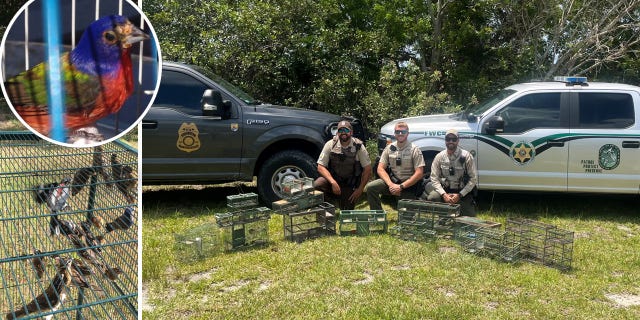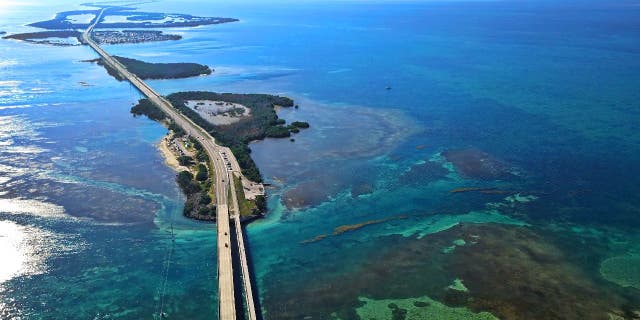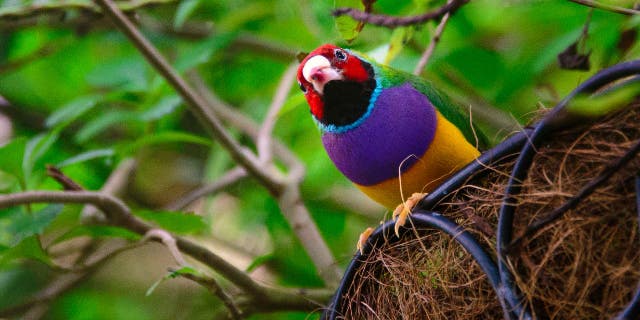Wildlife authorities in Florida found and confiscated illegal bird traps that were set on an island approximately 150 miles southwest of Miami.
On Thursday, May 4, officers with the Florida Fish and Wildlife Conservation Commission (FWC) discovered an active bird trap on a trail in Rockland Key, an island in the lower Florida Keys, which is part of Monroe County.
The FWC teamed up with a U.S. Fish and Wildlife Service (USFWS) officer, and within eight days, the two wildlife agencies tracked down their suspect through surveillance, according to a press release obtained by Fox News Digital.
FLORIDA K-9 STOPS THEFT OF RARE AND ENDANGERED ORCHIDS AT STATE PARK
Rockland Key resident Daniel Richard Acevedo, 77, reportedly visited the bird trap frequently, according to the FWC.

The Florida Fish and Wildlife Conservation Commission notified the public that illegal bird trapping is a problem in the state. (Florida Fish and Wildlife Conservation Commission)
Ten bird traps were seized from Acevedo’s home and were placed into evidence. The FWC issued a notice to Acevedo for the alleged possession and use of illegal bird traps.
“The public should be aware that trapping, possessing, buying and/or selling these birds is a violation of state and federal laws and can result in hefty fines and possible jail time,” FWC Area Captain David Dipre said in a statement.
“The use, placement and possession of bird traps without a permit is prohibited,” he continued.
PUPPY THROWN FROM MOVING TRUCK IN LOS ANGELES COULD FIND NEW HOME SOON
Photos of the bird trap seizure weren’t taken, but the FWC’s fish and wildlife department posted a photo collage from a past case to Facebook and Twitter on Tuesday, May 16, to let the public know that illegal bird trapping is an issue in Florida.
“Bird traps found in nature are usually placed there by poachers preying on and hoping to sell Florida’s native songbirds and brightly colored wild birds,” the MyFWC Florida Fish and Wildlife account posted on social media.
In a press release, the FWC noted that bird burglars place live bait or call birds in traps to attract migratory birds.
“The bird trap is considered active as long as it remains exposed to the open environment where wild birds have access to it, even if there are not any bait birds inside the trap,” the FWC explained.
ENDANGERED SPECIES IN THE US: FAST FACTS ABOUT CREATURES AT RISK OF GOING EXTINCT

The Florida Keys are made up of approximately 1,700 islands off the southern coast of Florida. The Seven Mile Bridge connects to a few islands, including Key Largo, Tavernier, Islamorada, Layton, Duck Key, Marathon, Big Pine Key and Key West. (iStock)
Captured birds are sold at various establishments, including some pet stores, according to the FWC.
Three bird trap permits exist in Florida. The permit categories are scientific collection, nonnative nuisance control and education and exhibition.
Hunting migratory birds requires a hunting license and a migratory bird permit. The hunting season runs from Sept. 1 to March 31.
CLICK HERE TO SIGN UP FOR OUR LIFESTYLE NEWSLETTER

The Florida Keys are home to a variety of colorful songbirds, including the Gouldian Finch (also known as Erythrura gouldiae), as seen in this image snapped from a Key West nest in Monroe County, Florida, which is about four miles from Rockland Key. (iStock)
Additional permits are required for hunting turkeys and waterfowl. The latter requires a Federal Duck Stamp for hunters who are 16 years of age or older.
Further information can be found on the FWC’s “Regulations for Bird Traps” and “Recreational Hunting Licenses & Permits” web pages.


